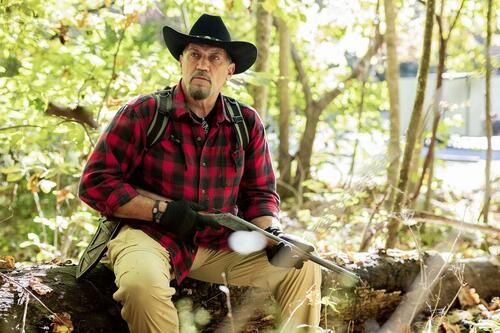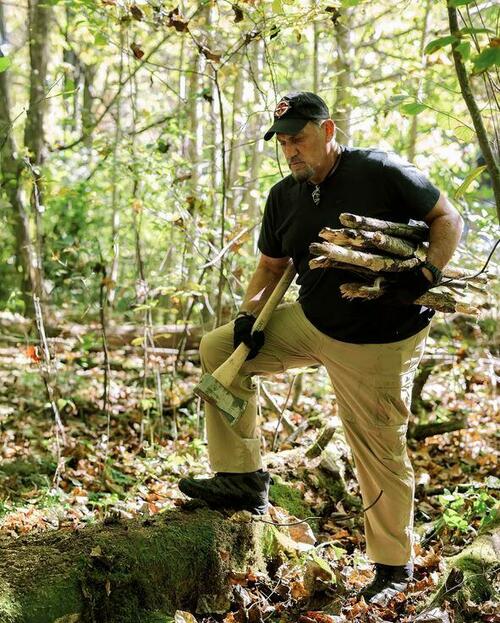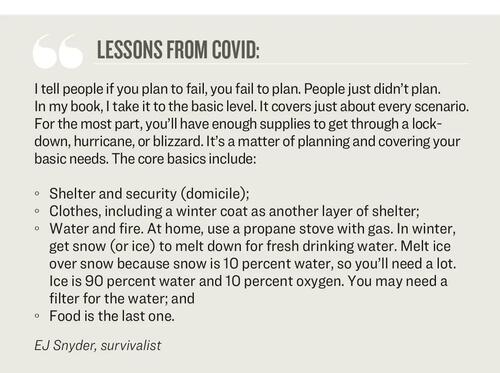
Authored by Krista Thomas via The Epoch Times (emphasis ours),
The Expert
EJ Snyder knows a thing or two about survival. After 25 years in the U.S. Army, he emerged as the extreme survivalist “Skullcrusher” on television shows like “Naked and Afraid,” “Dual Survival,” and “First Man Out.”

Today, in addition to teaching survival skills and speaking at events around the country, he also writes. His new book is “Emergency Home Preparedness: The Ultimate Guide for Bugging In During Natural Disasters, Civil Unrest, and More.” He’s also signed on as executive VP with SurvivalMastery.co, an online subscriber-based platform designed to teach self-sufficiency skills.
“It’s been God’s path for me. I love getting the word out about these things,” he said. “It’s a matter of confidence if you do plan for these things. It makes the situation a little bit easier.”
At the time of this interview, Snyder was putting his survivalist skills into practice in North Carolina, aiding other veterans with Hurricane Helene relief efforts. We tapped the former Army Ranger for advice on how best to prepare for any kind of emergency with survival skills.
The Epoch Times: There are a lot of different approaches to prepping, and different personalities teaching about the subject. What’s different about you and your approach?
EJ Snyder: I try to approach teaching survival skills with skull-crushing common sense based on reality. I want you to be able to do the tasks when it matters most. I teach super simply ... helping the everyday Joe or Joan to handle bad days and be sufficient.
The Epoch Times: How did you get interested in preparing for emergencies?
Mr. Snyder: When I was a little boy at 8 years old, I remember it was wintertime in the late afternoon, and we had been sitting in a tree stand. It was getting very cold. I followed the steps back a couple of miles to camp and it started snowing. I got distracted and I remember trying to follow my tracks, and I couldn’t see them because the snow covered them up.
I got lost and panicked. I saw a rock and thought I should get on the rock and call my dad. I was in the dark for an hour. My uncles and dad were looking for me and finally found me. My dad then taught me about a compass and it taught me to be prepared for any situation.
Later, I was a Ranger instructor and went to the U.S. Army SERE School. I became the primary survival and tracking expert for Ranger students. But Y2K was the real catalyst. I wanted myself and my family to be ready. So I started with a list of what I needed, like bug-out bags and stored foods such as rice. We had enough spaghetti for two years. If something would have happened, we would have been prepared. Several months later, we were able to help people survive a Category 3 storm.
That is how it all got started. It is critically important because we’ve got to save lives here. I’m passionate about survival to help people help themselves.

The Epoch Times: Can you tell us about emergencies that you may have been in, and how that went for you and yours?
Mr. Snyder: I remember there was a time when I was driving in the winter in upstate New York. I was big about preparedness by this point and made sure I had a winter survival kit in the vehicle: blankets, meals, extra coats, and dry clothing with gloves and hats. We were driving in a blizzard and the minivan slid off the road.
We were way out, like three miles to the main road. Cell service was down. At that time, cell towers were not that great, but I was hoping my text would have gone through to a neighbor. My son, who was 3, was nervous and scared.
We were there three hours and low on gas, so I wrapped us up in blankets and shut down the vehicle. I started a survival candle in a coffee can because it raises the temperature in the car by 5 to 10 degrees Fahrenheit. We sat there while I was keeping him calm, and we ate a little food and drank some water.
I decided to take action. I pulled out the sled and put my son in it, then got my winter boots and snow shoes on, and when we were bundled up we went hiking out three miles. Finally we got to an intersection and made it to a farmhouse, where I was able to make a landline phone call with my location. My neighbor with a four-wheel drive and skid plow picked us up and got us home. We had to wait a couple of days.
That’s being prepared and thinking through a plan. You want to be forward-thinking about having the basics and think about what might be missing. Murphy is always waiting to ambush you when things go wrong.
The Epoch Times: What kind of emergencies do you foresee the need to be prepared for, given the current state of the world?
Mr. Snyder: It’s pretty cut and dry because we’ve seen a lot. Man-made disasters, natural disasters, war, pandemic, and civil unrest are the main situations. Or we have to deal with active shooters who want to hurt people.
When you have these situations, you plan for them and always rehearse. Check your survival kit.
How about a fire in your home? Evacuate and make sure you know how to get out. If you’re bugging in, have you rehearsed your escape route? In emergency planning, you have to have a PACE plan, which stands for primary, alternative, contingency, and emergency. This is your action plan. To sum it up, survival is simple. Keep your planning simple.
The Epoch Times: How long should people be prepared to ride out an emergency?
Mr. Snyder: Seventy-two hours isn’t going to do squat! You should stock three meals per day for each person in your family, plus snacks and one gallon of water per day per person—enough to last for 90 days. Then, add enough for another person who might knock at your door. You can help your neighbor out. If you have to stretch it out, do one meal a day.
With 90 days down, start looking at six months for however many are in your family, rationing what you have plus supplies from fishing or hunting. You can stretch it out over a year.
Have heirloom seeds and freeze them up just in case the grocery stores aren’t available. When you freeze the seeds, you extend their shelf life. They will be ready when you need them.
Don’t be scared, be prepared. If you get some preparedness skills, it builds your confidence up. If you have prepared in an emergency situation, that’s power and confidence.
Fear cripples people. Not doing anything in an emergency situation can cost you your life. One of the big things is to remain calm. Then assess the situation, take care of the wounded and sick, and after that make a plan. What resources do you have? What equipment is available? Who is around you and what skills do they have? Make a detailed plan and share the details with everyone.
Rehearse and then execute. Have your situational awareness up. Adapt the plan as you go. Improvise if you have to and then, as they say, overcome. You’re a winner.
Don’t forget health and fitness. You should have on hand extra prescription glasses, prescription medications to last six months to a year, over-the-counter medicines, and first aid kits to handle cuts and bruises. Learn basic first aid. Learn how to suture.
Food and Water
The Epoch Times: What water storage and purification equipment do you have and recommend?
Mr. Snyder: I recommend getting five-gallon water jugs from a home improvement store. You can store water in an easy way. If you can’t afford it, buy water in jugs and refill them. Get 55-gallon drums to collect rainwater from your roof (to water plants or to wash).
Lastly, consider one of several types of water filtration systems, including the Lifesaver Water Purifier or the Grayl GeoPress, a bottle that gives you crystal clear drinking water. I can boil water right in it, as there’s a nesting cup and an actual stove sleeve. Sawyer is a good brand to consider, too.
Most of my systems are simplistic. Unless you have a backup generator, once you lose power, you won’t be able to power those sources. What can I have on hand that I don’t need electricity to generate? In emergency situations, have tradable items that you use, like gold and silver, because certain items will be important. It’s possible to be set back by 200 years.
The Epoch Times: Please walk us through the essential foods in your own long-term storage pantry. What makes each item a good choice?
Mr. Snyder: A good choice would be survival foods with nutritional value from My Patriot Supply. Store up on them, as they are packed with a lot of calories. MREs [meals, ready-to-eat] are good too because they have a long shelf life. After that, choose canned goods and dry goods like rice, black beans, pasta, dehydrated fruits, fruit snacks, and jerky.
Supplement by fishing and hunting and trapping. You don’t have to complicate it. Use snares. Learn how to process fish and game. Eventually, supplies will run out and you will need to go out and get your own food.
The Epoch Times: What essential emergency food storage and cooking equipment do you have and recommend?
Mr. Snyder: Always have multiple ways to cook. I recommend a BBQ grill. I do keep propane in a storage cage for my Blackstone grill. Another option is the RockPot, a pot that doesn’t require flame. It is amazing. You can throw it on your stone or in the fire to heat it up; it cooks your food in the case.
I have a ton of cast-iron frying pans and pots from The Lodge. Aluminum-type pans are good for backpacks. I have a fire pit with a cooking area with bricks for open fire. Backpack stoves are good for one person. I’ve had a Coleman 2 Burner Stove in my camping gear forever.
Read the rest here...
Authored by Krista Thomas via The Epoch Times (emphasis ours),
The Expert
EJ Snyder knows a thing or two about survival. After 25 years in the U.S. Army, he emerged as the extreme survivalist “Skullcrusher” on television shows like “Naked and Afraid,” “Dual Survival,” and “First Man Out.”

Today, in addition to teaching survival skills and speaking at events around the country, he also writes. His new book is “Emergency Home Preparedness: The Ultimate Guide for Bugging In During Natural Disasters, Civil Unrest, and More.” He’s also signed on as executive VP with SurvivalMastery.co, an online subscriber-based platform designed to teach self-sufficiency skills.
“It’s been God’s path for me. I love getting the word out about these things,” he said. “It’s a matter of confidence if you do plan for these things. It makes the situation a little bit easier.”
At the time of this interview, Snyder was putting his survivalist skills into practice in North Carolina, aiding other veterans with Hurricane Helene relief efforts. We tapped the former Army Ranger for advice on how best to prepare for any kind of emergency with survival skills.
The Epoch Times: There are a lot of different approaches to prepping, and different personalities teaching about the subject. What’s different about you and your approach?
EJ Snyder: I try to approach teaching survival skills with skull-crushing common sense based on reality. I want you to be able to do the tasks when it matters most. I teach super simply … helping the everyday Joe or Joan to handle bad days and be sufficient.
The Epoch Times: How did you get interested in preparing for emergencies?
Mr. Snyder: When I was a little boy at 8 years old, I remember it was wintertime in the late afternoon, and we had been sitting in a tree stand. It was getting very cold. I followed the steps back a couple of miles to camp and it started snowing. I got distracted and I remember trying to follow my tracks, and I couldn’t see them because the snow covered them up.
I got lost and panicked. I saw a rock and thought I should get on the rock and call my dad. I was in the dark for an hour. My uncles and dad were looking for me and finally found me. My dad then taught me about a compass and it taught me to be prepared for any situation.
Later, I was a Ranger instructor and went to the U.S. Army SERE School. I became the primary survival and tracking expert for Ranger students. But Y2K was the real catalyst. I wanted myself and my family to be ready. So I started with a list of what I needed, like bug-out bags and stored foods such as rice. We had enough spaghetti for two years. If something would have happened, we would have been prepared. Several months later, we were able to help people survive a Category 3 storm.
That is how it all got started. It is critically important because we’ve got to save lives here. I’m passionate about survival to help people help themselves.

The Epoch Times: Can you tell us about emergencies that you may have been in, and how that went for you and yours?
Mr. Snyder: I remember there was a time when I was driving in the winter in upstate New York. I was big about preparedness by this point and made sure I had a winter survival kit in the vehicle: blankets, meals, extra coats, and dry clothing with gloves and hats. We were driving in a blizzard and the minivan slid off the road.
We were way out, like three miles to the main road. Cell service was down. At that time, cell towers were not that great, but I was hoping my text would have gone through to a neighbor. My son, who was 3, was nervous and scared.
We were there three hours and low on gas, so I wrapped us up in blankets and shut down the vehicle. I started a survival candle in a coffee can because it raises the temperature in the car by 5 to 10 degrees Fahrenheit. We sat there while I was keeping him calm, and we ate a little food and drank some water.
I decided to take action. I pulled out the sled and put my son in it, then got my winter boots and snow shoes on, and when we were bundled up we went hiking out three miles. Finally we got to an intersection and made it to a farmhouse, where I was able to make a landline phone call with my location. My neighbor with a four-wheel drive and skid plow picked us up and got us home. We had to wait a couple of days.
That’s being prepared and thinking through a plan. You want to be forward-thinking about having the basics and think about what might be missing. Murphy is always waiting to ambush you when things go wrong.
The Epoch Times: What kind of emergencies do you foresee the need to be prepared for, given the current state of the world?
Mr. Snyder: It’s pretty cut and dry because we’ve seen a lot. Man-made disasters, natural disasters, war, pandemic, and civil unrest are the main situations. Or we have to deal with active shooters who want to hurt people.
When you have these situations, you plan for them and always rehearse. Check your survival kit.
How about a fire in your home? Evacuate and make sure you know how to get out. If you’re bugging in, have you rehearsed your escape route? In emergency planning, you have to have a PACE plan, which stands for primary, alternative, contingency, and emergency. This is your action plan. To sum it up, survival is simple. Keep your planning simple.
The Epoch Times: How long should people be prepared to ride out an emergency?
Mr. Snyder: Seventy-two hours isn’t going to do squat! You should stock three meals per day for each person in your family, plus snacks and one gallon of water per day per person—enough to last for 90 days. Then, add enough for another person who might knock at your door. You can help your neighbor out. If you have to stretch it out, do one meal a day.
With 90 days down, start looking at six months for however many are in your family, rationing what you have plus supplies from fishing or hunting. You can stretch it out over a year.
Have heirloom seeds and freeze them up just in case the grocery stores aren’t available. When you freeze the seeds, you extend their shelf life. They will be ready when you need them.
Don’t be scared, be prepared. If you get some preparedness skills, it builds your confidence up. If you have prepared in an emergency situation, that’s power and confidence.
Fear cripples people. Not doing anything in an emergency situation can cost you your life. One of the big things is to remain calm. Then assess the situation, take care of the wounded and sick, and after that make a plan. What resources do you have? What equipment is available? Who is around you and what skills do they have? Make a detailed plan and share the details with everyone.
Rehearse and then execute. Have your situational awareness up. Adapt the plan as you go. Improvise if you have to and then, as they say, overcome. You’re a winner.
Don’t forget health and fitness. You should have on hand extra prescription glasses, prescription medications to last six months to a year, over-the-counter medicines, and first aid kits to handle cuts and bruises. Learn basic first aid. Learn how to suture.
Food and Water
The Epoch Times: What water storage and purification equipment do you have and recommend?
Mr. Snyder: I recommend getting five-gallon water jugs from a home improvement store. You can store water in an easy way. If you can’t afford it, buy water in jugs and refill them. Get 55-gallon drums to collect rainwater from your roof (to water plants or to wash).
Lastly, consider one of several types of water filtration systems, including the Lifesaver Water Purifier or the Grayl GeoPress, a bottle that gives you crystal clear drinking water. I can boil water right in it, as there’s a nesting cup and an actual stove sleeve. Sawyer is a good brand to consider, too.
Most of my systems are simplistic. Unless you have a backup generator, once you lose power, you won’t be able to power those sources. What can I have on hand that I don’t need electricity to generate? In emergency situations, have tradable items that you use, like gold and silver, because certain items will be important. It’s possible to be set back by 200 years.
The Epoch Times: Please walk us through the essential foods in your own long-term storage pantry. What makes each item a good choice?
Mr. Snyder: A good choice would be survival foods with nutritional value from My Patriot Supply. Store up on them, as they are packed with a lot of calories. MREs [meals, ready-to-eat] are good too because they have a long shelf life. After that, choose canned goods and dry goods like rice, black beans, pasta, dehydrated fruits, fruit snacks, and jerky.
Supplement by fishing and hunting and trapping. You don’t have to complicate it. Use snares. Learn how to process fish and game. Eventually, supplies will run out and you will need to go out and get your own food.
The Epoch Times: What essential emergency food storage and cooking equipment do you have and recommend?
Mr. Snyder: Always have multiple ways to cook. I recommend a BBQ grill. I do keep propane in a storage cage for my Blackstone grill. Another option is the RockPot, a pot that doesn’t require flame. It is amazing. You can throw it on your stone or in the fire to heat it up; it cooks your food in the case.
I have a ton of cast-iron frying pans and pots from The Lodge. Aluminum-type pans are good for backpacks. I have a fire pit with a cooking area with bricks for open fire. Backpack stoves are good for one person. I’ve had a Coleman 2 Burner Stove in my camping gear forever.
Read the rest here…
Loading…






